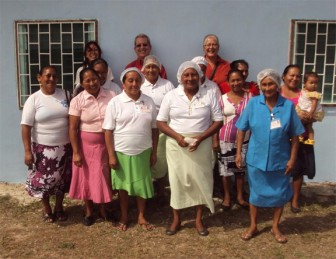The Canadian High Commission formally presented the newly upgraded food processing facilities to the Helping Hand Women’s Group in St Ignatius, Region Nine on Thursday.
In a press release, the mission said Raymond Drouin – Counsellor (Development), Head of Development Cooperation, presented the facility to Chairperson Emiline Barreto and group members. “The handing over of these facilities is a demonstration of the Government of Canada’s ongoing commitment to the development and empowerment of indigenous communities in Guyana,” the statement said.
In his address, Drouin encouraged the group not only to reflect on the important role they are playing in providing safe, high quality and nutritious food for their families and community, but to be proud of the fact that they are contributing towards achieving the global goals of eradicating hunger and poverty, as well as job creation and income generation for women.
The Canada Fund for Local Initiatives (CFLI) project provided Cdn$17,600 ($3,519,000) for the structural and technical upgrading of the facility.

The old structure was refurbished, the layout redesigned and semi-industrial equipment and instruments installed in order to bring it up to an acceptable standard for registration as a food processing unit by the Food and Drug Department. The new building is expected to enhance the group’s processing capabilities, manufacturing practices, compliance with product quality and safety standards, as well as boost capacity in business management. CFLI is pleased to have partnered with the Voluntary Services Organization which implemented this most recent support to the group.
The Helping Hand Women’s Group is an established cottage industry which has been operational since 1999 and has demonstrated incremental progress and expansion as a business, the release said. It registered as a cooperative society in 2009 and its membership comprises 16 highly experienced indigenous women.
Their efforts have received support and assistance from a number of local, national and international state departments and NGOs.
The group is one of seven cottage industries set up and funded by CFLI in the early 2000s to process peanuts into peanut butter snacks as part of the Ministry of Education School Snacks Programme for nursery schools in the region. “Historically the program has formed the highest proportion of income of all the cottage industries compared to local sales,” the release said.





